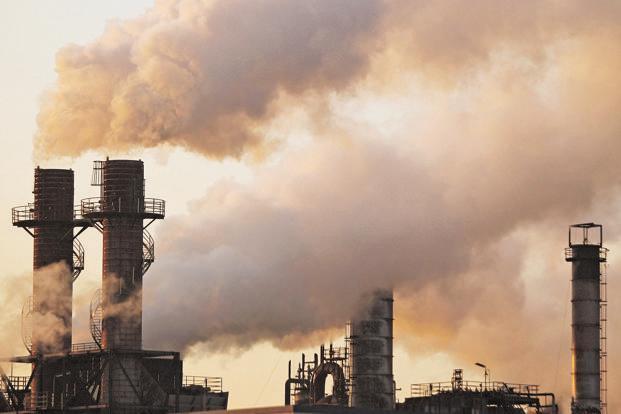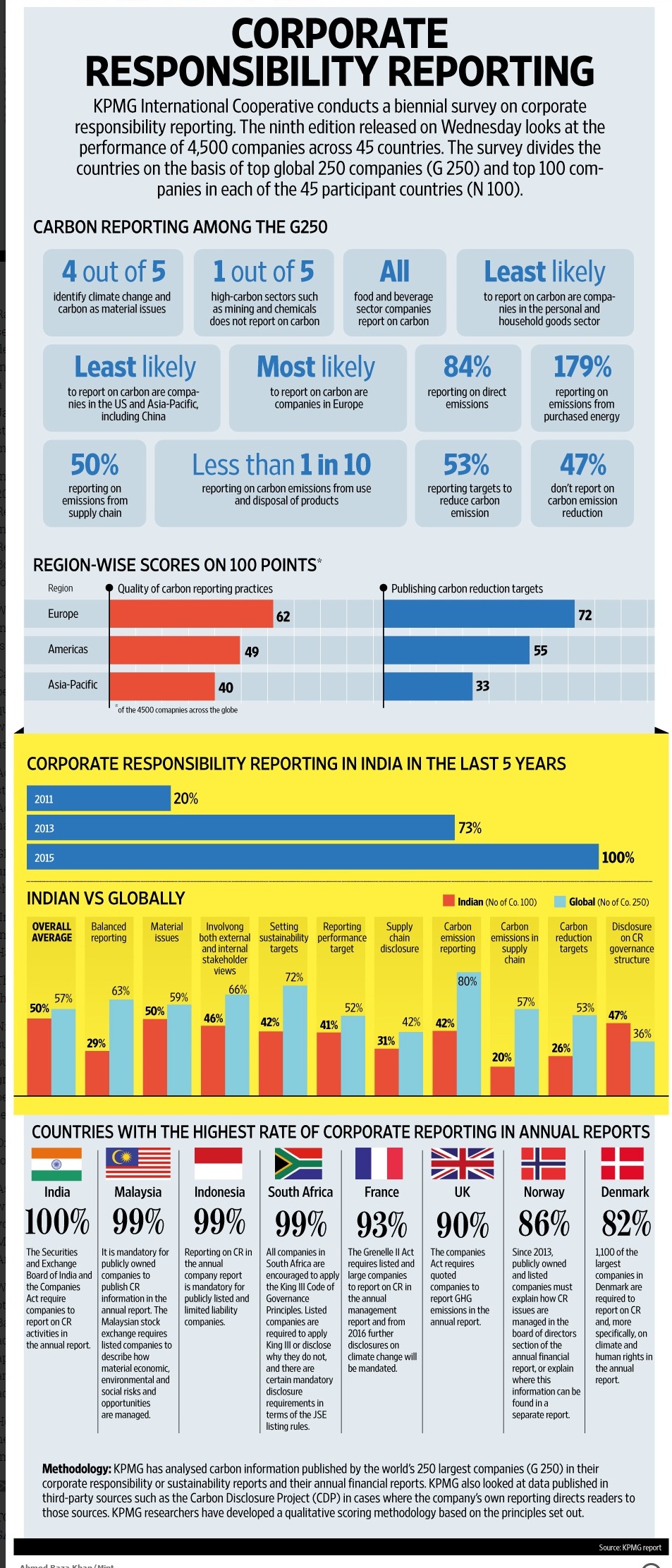India tops when it comes to the number of firms reporting on corporate responsibility, finds a KPMG International survey
India steals the show when it comes to responsibility reporting, suggests the 9th edition of a survey on corporate responsibility reporting by KPMG International Cooperative.

The Swiss company, in partnership with its affiliate KPMG across 45 countries, including India, covered 4,500 companies in the survey, the results of which were released on Wednesday.
Called ‘Currents of Change’, the survey on corporate responsibility reporting in 2015 culls out information from the top 100 companies in each country (N 100) surveyed to map trends. The information is based on publicly available documents and is analysed on a qualitative scoring methodology devised by KPMG International.
The N 100 comprises the top 100 listed companies in the participant country.
The survey also puts out a list of the top 250 firms across the globe (G 250) with regard to corporate responsibility (CR) reporting and has a large section dedicated to carbon disclosures.
The key findings of the survey suggest that globally, 1 in every 5 high-carbon-footprint companies, like those in the mining or chemicals sectors, do not report on carbon. And, “less than 1 in 10 companies reports on carbon emissions from the use or disposal of their products”.
“We also analysed the quality of carbon disclosures in India. It was found that 62% of Indian companies identify climate change as a material issue and 42% of N 100 companies report on carbon emissions as compared to 80% of G 250 companies,” said Santhosh Jayaram, director-sustainability at KPMG India.
With the United Nations’ climate change talks, called the Conference of Parties (CoP) 21, just weeks away, the importance of carbon disclosures is not lost on Indian firms.
Rajeev Dubey, group president (HR and corporate services) and CEO (after-market sector) of the Mahindra Group, said, “We know that the future of our planet depends on following a low-carbon path. Corporations play a very important role in ensuring that society gets onto this low-carbon path and carbon disclosures are a transparent way of achieving this objective.”
Jayaram hopes that the report will “encourage corporates to take more pro-active steps to help mitigate climate change”. He adds that the survey is akin to holding a mirror to companies, showcasing their non-financial reporting.
India has seen the biggest jump in overall corporate responsibility reporting—from 20% in 2011 to 73% in 2013 and 100% in 2015, the highest among the 45 countries. Reporting on sustainability governance has gained importance for companies in India due to additional disclosures required as part of the Business Responsibility Reporting (BRR) directive from capital market regulator Securities and Exchange Board of India in 2012 and Section 135 of the Companies Act, 2013, which pertains to corporate social responsibility.
While the number of Indian companies reporting and disclosing non-financial information has seen a sharp rise, the quality of the reports has not kept pace and is largely legislation-driven.
Cautioning against celebrating the fact that India has the highest CR reporting percentage, Jayaram points out that India still lags behind the G 250 in terms of quality of reportage. “Indian companies lack in terms of making balanced reports, with only a limited number of companies talking about challenges and dilemmas as part of their disclosures,” he said.
Aditi Haldar, director, Global Reporting Initiative (GRI) India, believes that the first step to improving sustainability and corporate responsibility is reporting. According to her, Indian companies are keen to be seen as global players, which has been another factor in the improved CR reporting in the country.
GRI is an international organization that helps businesses and governments understand and communicate the impact of business on issues such as climate change, human rights, etc.
“India has emerged as a major global economic player and transparency is important for many foreign investors who are interested in Indian businesses,” Haldar said.
The importance of corporate responsibility reporting is gaining momentum across the globe.
Nisha Agarwal, CEO of not-for-profit Oxfam India, explained, “Reporting on sustainability and responsibility indicators gives crucial insights to how a business will cope with the changing socio-economic environment. In India, it’s great that progressive regulations on BRR are in place and that companies are beginning to put in place transparent mechanisms to comply with these regulations.”
Oxfam India released the India Responsible Business Forum (IRBF) index for the top 100 NSE companies last month.
As per the KPMG survey, growth in CR reporting was driven by a surge in reporting within countries such as India, Taiwan and South Korea, where mandatory and voluntary reporting requirements were introduced since the last survey in 2013. More than 79% companies in this region now report on CR, followed by the Americas with 77% and Europe with 74%.
While the findings of the 2015 KPMG survey are encouraging in certain aspects, in others, they bring to the fore a number of inconsistencies. The report, quoting Wim Bartels, KPMG’s global head of sustainability reporting and assurance, says: “What actually emerges from KPMG’s analysis is a view of fragmented, inconsistent approaches and patchy transparency. Key information is missing from many annual financial and corporate responsibility reports… It is all but impossible to accurately compare one company’s carbon performance with another’s.”
However, Jayaram is optimistic that Indian companies are going to improve in the near future. According to him, the involvement of the top management will help improve the quality of CR reporting in the near future as it has for the quantity.
This article was taken from here.

